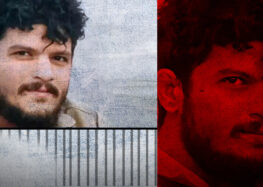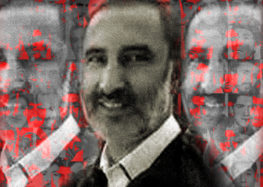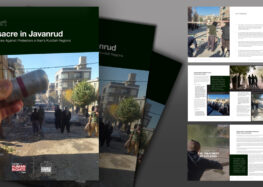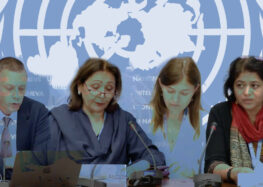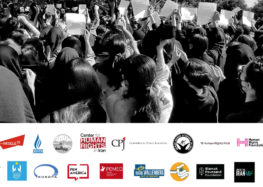25 Legal Experts Urge Iranian Official to Address “Public Archive” of Abuses Against Baha’is
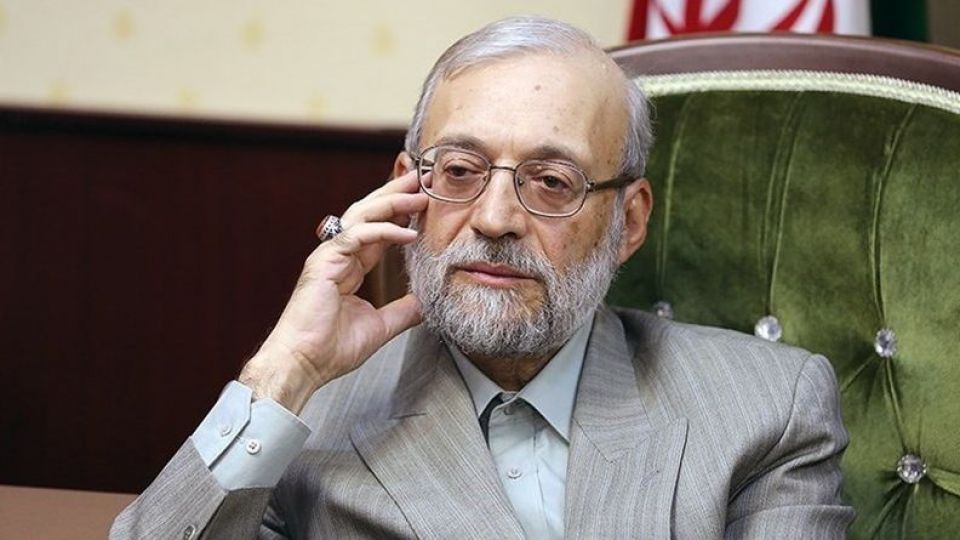 Twenty-five professors, lawyers and judges from around the world have called on the head of Iran’s High Council for Human Rights, Mohammad Javad Larijani, to address documented human rights violations against members of the Baha’i faith in Iran compiled on a newly launched website. “The persecution of the Bahá’ís by the Islamic Republic of Iran demonstrates a breach of Iran’s obligations both domestically and internationally,” note the signatories including Richard Gladstone, the first UN chief prosecutor of the International Criminal Tribunals for the former Yugoslavia and Rwanda.
Twenty-five professors, lawyers and judges from around the world have called on the head of Iran’s High Council for Human Rights, Mohammad Javad Larijani, to address documented human rights violations against members of the Baha’i faith in Iran compiled on a newly launched website. “The persecution of the Bahá’ís by the Islamic Republic of Iran demonstrates a breach of Iran’s obligations both domestically and internationally,” note the signatories including Richard Gladstone, the first UN chief prosecutor of the International Criminal Tribunals for the former Yugoslavia and Rwanda.
Iran’s Constitution does not recognize the Baha’i faith as an official religion. Although Article 23 states that “no one may be molested or taken to task simply for holding a certain belief,” followers of the faith are denied many basic rights as one of the most severely persecuted religious minorities in the country.
His Excellency Mohammad Javad Larijani Secretary-General
High Council for Human Rights in Iran
Your Excellency,
We write to you as head of the High Council for Human Rights in Iran, the branch of the Iranian judiciary which, according to the Iranian Constitution, “protects individual and social rights and is responsible for actualizing justice.”
As you may be aware, for the past four decades, the Bahá’ís in Iran, the largest non- Muslim religious minority in your country, have suffered ongoing persecution and discrimination for no other reason than belief in their Faith. During this period, hundreds of documents— including Government documents—were brought to the attention of the United Nations (UN) and other international organizations evidencing this continuous persecution. A website was recently launched which provides, for the first time, a public archive of these and thousands of other reports, documents, and audio-visual materials that have been amassed over time. Titled the Archives of Bahá’í Persecution in Iran, this collection of records vividly demonstrates the depth and breadth of unjust, relentless, and systematic oppression against a religious minority. It also provides evidence in the form of contemporaneous documents of this persecution which contrasts sharply with statements of denial made over the years by the Iranian authorities.
We note, for example, that in October 2014, during the assessment of Iran’s human rights record pursuant to the UN Universal Periodic Review, you stated the following in response to questions raised by numerous concerned States about the ongoing persecution of the Bahá’ís: “Bahá’ís are [a] minority in Iran… they are dealt [with] under the so-called citizenship contract. So under this citizenship contract, they enjoy all the privileges of any citizen in Iran.” You further stated that “they are very much affluent people”, and that: “They have professors at the university. They have students at the university. So they enjoy all the possibility of privileges.”
The records found on the new website, however, present a different story. A court verdict from the government’s Department of Justice regarding the murder of a Bahá’í man states that, “as the victim was a Bahá’í at the time of accident… and the fact that the provision of blood money [diyeh] is only legally applicable to Muslims”, the accused is acquitted of charges. An official letter from the General Office of the Department of Education in Tehran to a junior high school student states that she “was a very well-behaved student”, but that she was being expelled “in accordance with the provisions of the Constitution of the Islamic Republic as she is a follower of the Bahá’í sect”. A letter from the General Affairs Educational Office of the University of Isfahan to a student states that, as she is “a follower of the Bahá’í sect”, she is “not permitted to pursue [her] studies”. A letter from the Court of Administrative Justice to a person with disabilities informs him that he has been “dismissed from his job due to his membership in the Bahá’í sect”, that his pension benefits have been stopped, and that his further complaints to the court are “deemed invalid and rejected”. A letter from the Ministry of Education to one of its employees states that she is “dismissed from service in the [Ministry] of Education” and is “ordered to return all salaries received” as she is “affiliated with the illegal Bahá’í sect”.
5 February 2018
Your Excellency,
Countless more documents reveal other human rights abuses against the Bahá’ís among which include: imprisonment and executions; confiscation and destruction of Bahá’í cemeteries and exhumation of bodies of deceased Bahá’ís; expulsion of Bahá’í artists and athletes from their professions; attacks on and burning of homes, and the closure of small Bahá’í shops. These all testify to the unjust manner in which the Bahá’ís have been treated by those very governmental institutions that have an obligation in law to defend them.
Article 14 of the Iranian Constitution states that “the government of the Islamic Republic of Iran and Muslims are required to treat the non-Muslim individuals with good conduct, in fairness and Islamic justice, and must respect their human rights.” We ask, how can the prevention of thousands of young people from access to university be considered fair? How can Islamic justice be upheld when efforts are made to exclude an entire community from participating in the economic life of their own country? How can human rights be respected when innocent individuals are arbitrarily arrested, tortured, and imprisoned for many years; or when they are legally deprived of the right to seek justice for crimes committed against them and when the perpetrators are treated with impunity?
Such persecution and discriminatory treatment represents violations of international law, including a number of treaties to which Iran is a party, such as the International Covenant on Civil and Political Rights (ICCPR) and the International Covenant on Economic, Social and Cultural Rights (ICESCR). For example, Article 26 of the ICCPR states that “All persons are equal before the law and are entitled without any discrimination to the equal protection of the law.” It further adds that “the law shall prohibit any discrimination and guarantee to all persons equal and effective protection against discrimination on any ground such as race, colour, sex, language, religion, political or other opinion, national or social origin, property, birth or other status.”
The persecution of the Bahá’ís by the Islamic Republic of Iran demonstrates a breach of Iran’s obligations both domestically and internationally. The documentation provided on the Archives sheds light on the systematic nature of this persecution and reveals its magnitude and reach to all regions of Iran, and its impact on Bahá’ís from all walks of life.
In light of the comments above, we respectfully call upon you, as the official entrusted with the responsibility to ensure justice, to examine the website and reconsider your previous statements. In doing so, we trust that you will come to accept and better understand the sheer scale of the state-sponsored persecution against the Bahá’ís in Iran. We further urge you to take immediate and decisive steps to ensure that the provisions of international human rights standards, as well as those enshrined in Iran’s own legal system, are applied in full to everyone within your jurisdiction without discrimination.
Yours respectfully,
Abdullahi Ahmed An-Na‘im
Charles Howard Candler Professor of Law
Emory University School of Law
Mehrsa Baradaran
Associate Dean for Strategic Initiatives
J. Alton Hosch Associate Professor of Law University of Georgia School of Law
(cont.)
Upendra Baxi
Emeritus Professor of Law in Development University of Warwick
Kirsty Brimelow QC
International Human Rights Lawyer Doughty Street Chambers
Chair of Bar Human Rights Committee of England and Wales
Khaled Abou El Fadl
Omar and Azmeralda Alfi Professor of Law Deputy Chair of Islamic Studies Program University of California, Los Angeles School of Law
Lord Anthony Gifford QC
Doughty Street Chambers Senior Partner
Gifford Thompson & Bright
Richard Goldstone
Retired Justice of the Constitutional Court of South Africa
First UN Chief Prosecutor of the International Criminal Tribunals for the former Yugoslavia and Rwanda
Claudio Grossman
Professor of Law, Dean Emeritus Raymond I. Geraldson Scholar for International and Humanitarian Law American University Washington College of Law
Christof Heyns
Professor of Human Rights Law Director of the Institute for International and Comparative Law in Africa University of Pretoria
Cora Hoexter
Professor of Law
University of the Witwatersrand School of Law
Baroness Helena Ann Kennedy QC
Baroness Kennedy of The Shaws Justice of the British arm of the International Commission of Jurists Principal of Mansfield College Oxford
Karim A. A. Khan QC
International Human Rights Lawyer Temple Garden Chambers
Former Legal Advisor in the Office of the Prosecutor in the United Nations International Criminal Tribunals for the former Yugoslavia and Rwanda
Piet Meiring
Emeritus Professor of Theology
University of Pretoria
Former member of the South African Truth and Reconciliation Commission
Juan E. Mendez
Professor of Human Rights Law in Residence
Washington College of Law
Former UN Special Rapporteur on Torture
Sir Geoffrey Nice QC
Professor of Law
Gresham College
Former UN Prosecutor at the International Criminal Tribunal for the former Yugoslavia
Michael J. Perry
Robert W. Woodruff Professor of Law Emory University School of Law
Niels Petersen
Professor of Public Law, International and European Law
University of Münster
Catherine Powell
Professor of Law Fordham Law School
René Provost
Professor of Law
Centre for Human Rights and Legal Pluralism
McGill University
Jaya Ramji-Nogales
Associate Dean for Academic Affairs
I. Herman Stern Research Professor Temple University, Beasley School of Law
Ingo Wolfgang Sarlet
Professor of Constitutional Law Pontifical Catholic University
Judge of the Rio Grande do Sul State Appeals Court
Soli Sorabjee
Senior Advocate
Supreme Court of India
Former Attorney General for India
Patrick Thornberry CMG
Emeritus Professor of International Law Keele University
Former member of the UN Committee on the Elimination of Racial Discrimination
Hildebrando Tadeu Valadares
Ambassador (ret.) of Brazil
Johan D. van der Vyver
I. T. Cohen Professor of International Law and Human Rights
Emory University School of Law

